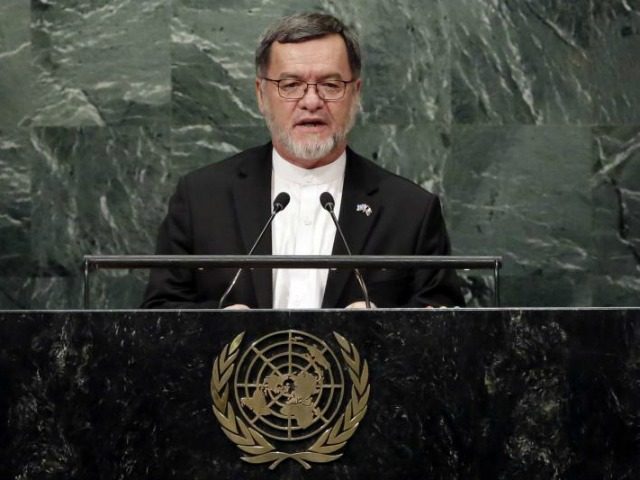The vice president of Afghanistan, in his address to the United Nations General Assembly on Tuesday, only once alluded to his country’s widespread and endemic corruption that an independent U.S. watchdog agency recently determined may pose a bigger threat to the future of the country and America’s mission than the insurgency.
Corruption has permeated nearly all aspects of the politics of Afghanistan, according to a recent analysis by the Special Inspector General for Afghanistan Reconstruction (SIGAR) John Sopko, an independent U.S. watchdog appointed by Congress.
A detailed mention of corruption in Afghanistan could have provided the world with a reality check about the state of affairs inside the country. Corruption is nothing new, but it has reached a level where it may be posing the biggest threat to security and nation-building efforts in the country, SIGAR points out.
Sarwar Danesh, the Afghan VP, declared:
We are sparing no effort in implementing our commitments to reforms. Our well planned and systematic efforts are ongoing to eliminate corruption; strengthen good governance; conduct judicial reforms; promote women’s empowerment; ensure effective service delivery for our citizens; ensure accountability standards are all levels of the government; institutionalize merit based appointments of senior officials; as well as to secure transparency of government contracts with the establishment of the national procurement committee.
Danesh did explain or highlight the problems that corruption is creating for Afghanistan’s future.
In September 2015, Afghan President Ashraf Ghani vowed to wage a “national jihad” at the entrenched corruption that he acknowledged was endemic at all levels of the Afghan government. But that was then and corruption has continued to grow.
While corruption was nearly ignored by Danesh, it has reached a level of monstrous and pervasive proportions with the help of tens of billions in taxpayer dollars the United States has poured into the Afghan economy without proper oversight, flawed contracting practices, and while partnering with bad actors, including drug traffickers, arms smugglers, human rights violators, and other criminals who, thanks to the United States, now hold powerful political power.
This is what SIGAR emphasized in a report released last week.
Moreover, the omnipresent threat emanating from corruption has reportedly undermined the multibillion dollar U.S. mission in Afghanistan, as well as the interest of the Afghan people, by turning the population away from the government and into the hands of terrorist groups like the Taliban. U.S. taxpayer funds are also being channeled to the insurgency and maintaining those groups active nearly 15 years after the war against both the Taliban and al-Qaeda started in Afghanistan.
Danesh conceded that Afghanistan continues to face serious security challenges, particularly from the ever-resilient Taliban and growing the Islamic State (ISIS/ISIL) branch in the country.
By no means was corruption unprecedented before the start of the war in October 2001, but it has reportedly grown much stronger since.
American taxpayer money is being siphoned to fund the same insurgency that is killing and maiming both American and Afghan security forces. Corruption has even helped terrorism proliferate in Afghanistan, even attracting militants from other countries.
The Afghan VP acknowledged during his speech:
Currently, more than ten terrorist groups who are sent from outside Afghanistan with the goal of creating obstacles from our state building efforts and preventing the establishment of peace and stability are fighting against us in Afghanistan. One of their main objectives is to suppress democracy, freedom of speech, and our free and independent media.
Many analysts believe that corruption is one of the primary enemies, if not the number-one obstacle, to democracy.
The Afghan VP stressed that Pakistan continues to serve as a sanctuary for the Taliban, al-Qaeda, and other terrorist groups, saying most of the attacks in Afghanistan are planned across the border in the neighboring country.
However, citing the U.S. Embassy in Kabul, former Ambassador to Afghanistan Ryan Crocker, and Gen. John Allen, who served as the top commander of U.S. and NATO forces in Afghanistan, SIGAR noted that corruption may present a bigger or at least equal threat to the future of Afghanistan than the insurgency and its safe havens in Pakistan.
In 2014, Gen. John Allen, soon after he retired from his position as the top commander of U.S. and NATO forces in Afghanistan, said, “The great challenge to Afghanistan’s future is not the Taliban or Pakistani safe havens or even an incipiently hostile Pakistan. The existential threat to the long-term viability of modern Afghanistan is corruption.”
Danesh did not once mention last weekend’s bombings in New York and New Jersey at the hands of Ahmad Rahami, a naturalized U.S. citizen born in Afghanistan.
Afghan President Ashraf Ghani did send his condolences to the families of the victims when Omar Mateen, a U.S. citizen born to Afghan parents, carried out the Orlando massacre at a gay nightclub in June.

COMMENTS
Please let us know if you're having issues with commenting.